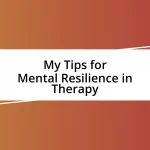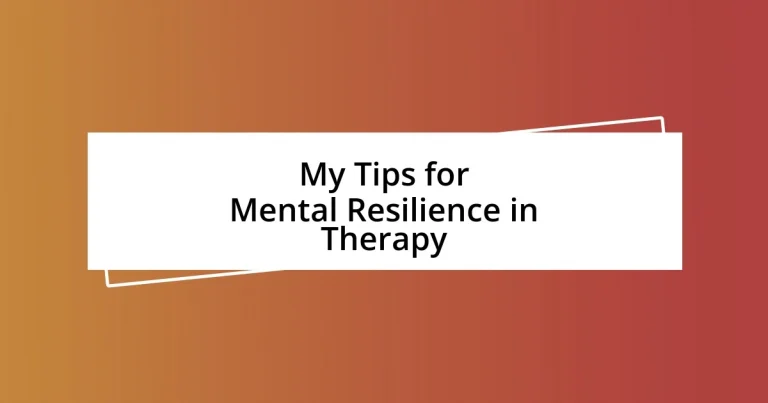Key takeaways:
- Mental resilience involves the ability to adapt, embrace vulnerability, and utilize support systems to navigate challenges and foster personal growth.
- Practicing mindfulness, journaling, and seeking social support are effective techniques for building and maintaining resilience in therapy and daily life.
- Long-term resilience is strengthened through regular reflection, nurturing supportive relationships, and setting realistic goals that celebrate small achievements.
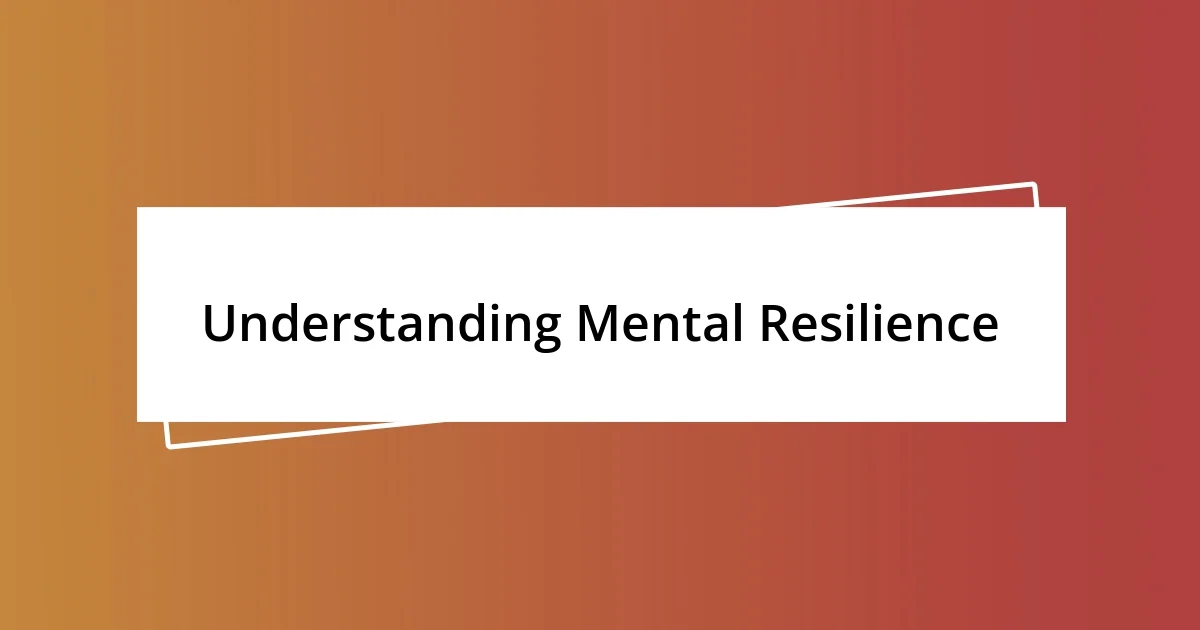
Understanding Mental Resilience
Mental resilience is essentially our ability to bounce back from difficulties and adapt to challenges. I remember a time in my own life when everything felt overwhelming; I faced setbacks at work and in personal relationships. During those moments, I often questioned, “How can I keep going?” It was through acknowledging my feelings and embracing vulnerability that I began to understand true resilience.
Resilience is more than just a response to stress; it’s about creating a mindset that allows us to navigate life’s ups and downs. I’ve learned that it often involves a blend of optimism and realism. For instance, when I experienced a significant loss, instead of pushing away my grief, I leaned into it. This not only helped me process my emotions but also strengthened my ability to cope with future challenges. Have you ever noticed how facing adversities can lead to personal growth, almost like forging steel in fire?
Understanding mental resilience also means recognizing the importance of support systems. I distinctly remember how a simple conversation with a friend, sharing my struggles, made me feel less alone. We often forget to lean on others when we’re down—do we fear judgment or simply overlook the strength in connection? In my experience, fostering these relationships not only provides comfort but also builds a collective resilience that can be incredibly powerful.
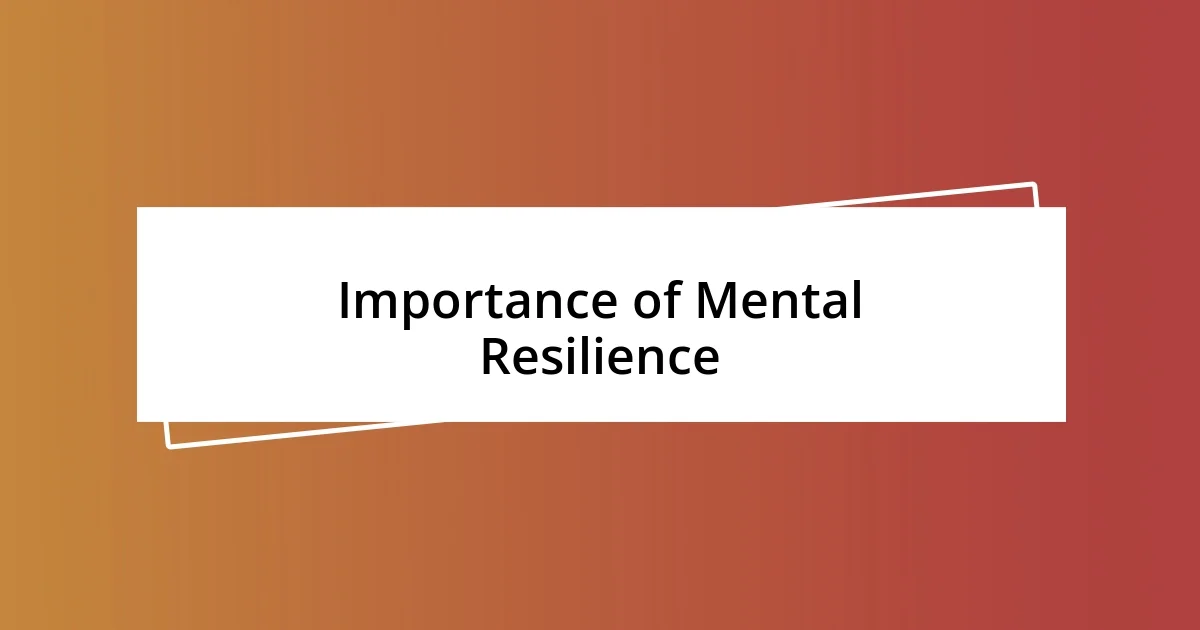
Importance of Mental Resilience
The significance of mental resilience in our lives can’t be overstated. When we cultivate mental resilience, we empower ourselves to face adversities with a sense of strength and adaptability. I recall a particularly challenging time in my career when setbacks seemed relentless. However, embracing resilience not only helped me regain my footing but also opened my eyes to new opportunities. Instead of viewing challenges as roadblocks, I learned to see them as stepping stones for growth.
- Adaptability: It allows us to adjust our plans, learn from experiences, and keep moving forward despite setbacks.
- Strengthen Relationships: Resilience nurtures our connections, reminding us that vulnerability can bring us closer to others.
- Enhanced Well-Being: Developing resilience supports our mental and emotional health, leading to a more fulfilling life.
Overall, my journey has reinforced the understanding that building mental resilience is a continual process, rich with lessons and growth. The moments that challenge us often reveal our inner strength and help us develop a more robust foundation for future challenges.
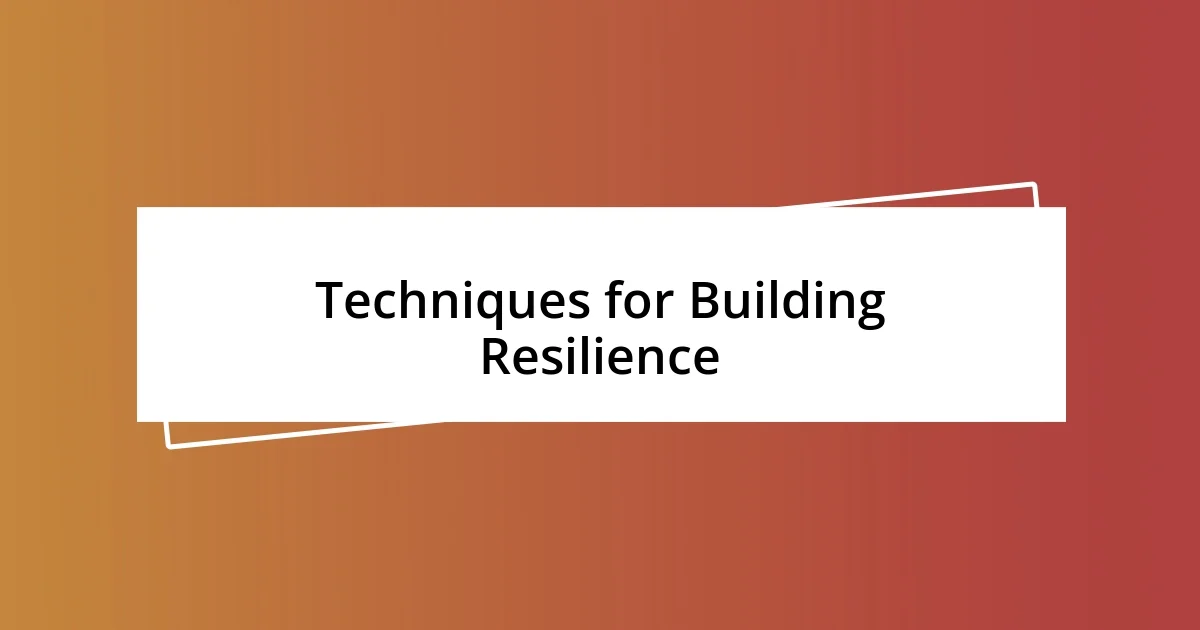
Techniques for Building Resilience
When it comes to building resilience, I’ve found that incorporating mindfulness techniques can be incredibly beneficial. For example, during a particularly stressful week, I set aside just ten minutes a day to practice mindfulness meditation. This simple act allowed me to center myself and gain clarity amidst chaos. Mindfulness encourages us to stay present, letting go of worries about the past or future, which can often feel overwhelming.
Another powerful technique is journaling. I remember a time when I was wrestling with difficult emotions after a personal loss. Writing down my thoughts helped me process my feelings and provided a space for reflection. Journaling offers clarity and can reveal patterns in our thinking that we might not notice otherwise. It’s like having a heart-to-heart with yourself, which can be profoundly healing. Have you ever tried putting your thoughts on paper? It can be surprisingly liberating.
Seeking social support is also a key element in building resilience. I’ve learned that reaching out to friends during tough times not only provides comfort but often sparks uplifting conversations. I distinctly recall a night I felt particularly low; simply sharing my feelings with a friend turned the tide of my emotions. It’s essential to remember that vulnerability is indeed a strength. We don’t have to face our challenges alone, and tapping into our support systems can bolster our resilience significantly.
| Technique | Description |
|---|---|
| Mindfulness | Practicing mindfulness helps center thoughts in the present, reducing anxiety about past or future events. |
| Journaling | Writing down feelings aids in processing emotions and reflects personal patterns, providing clarity and insights. |
| Social Support | Engaging with friends or family creates a safety net, reminding us we aren’t alone in facing life’s challenges. |
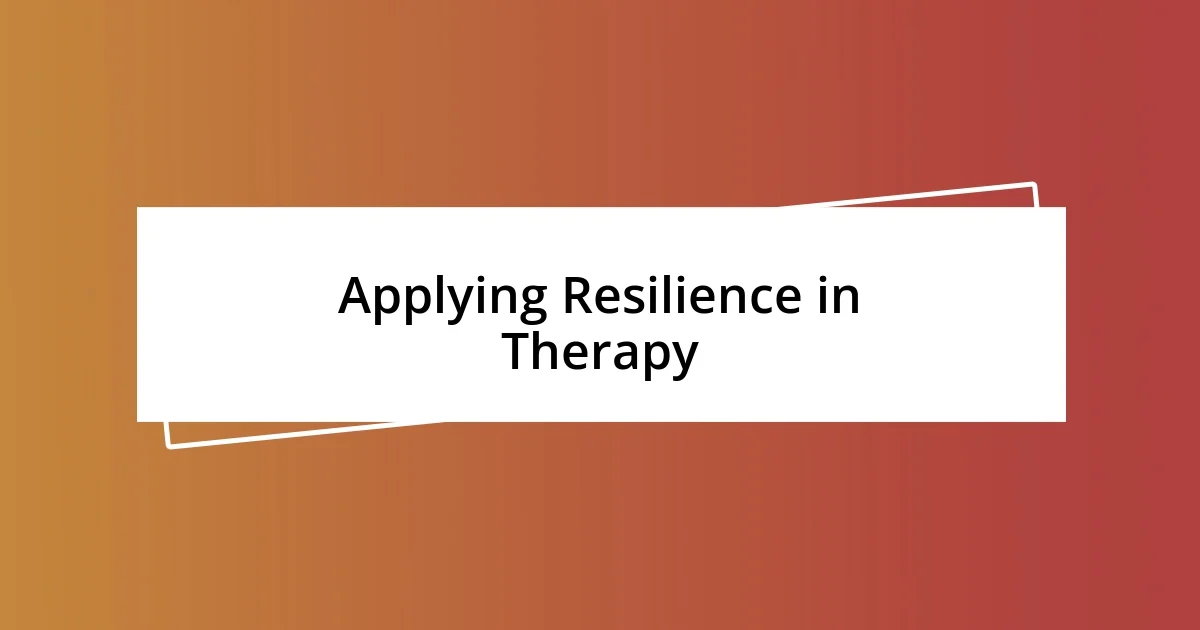
Applying Resilience in Therapy
Applying resilience in therapy can look quite different for each person, but one common thread is the importance of reframing our views on setbacks. I remember when a particular therapy session felt especially challenging, and I left feeling deflated. Instead of allowing that experience to defeat me, I started to think of it as part of my therapeutic journey. It’s amazing how shifting that perspective made the process feel less like a struggle and more like an opportunity for growth.
Another aspect is how we use our coping strategies effectively during therapy. There was a time when I would often rush through my feelings without really processing them. I realized that taking a moment during therapy to discuss my coping mechanisms was crucial. Why not dive deeper into what strategies work best for me? This approach not only fostered greater self-awareness but also reinforced my resilience, creating a deeper understanding of my emotional responses.
Also, I find it significant to embrace vulnerability in therapy. It can be daunting to share our most intimate struggles, yet I’ve learned that doing so can be incredibly empowering. Have you ever felt lighter after confiding in someone? I recall opening up about my fears during one session and feeling an overwhelming sense of release. This vulnerability not only strengthened the therapeutic alliance but also allowed me to tap into my resilience and better understand my emotional landscape.
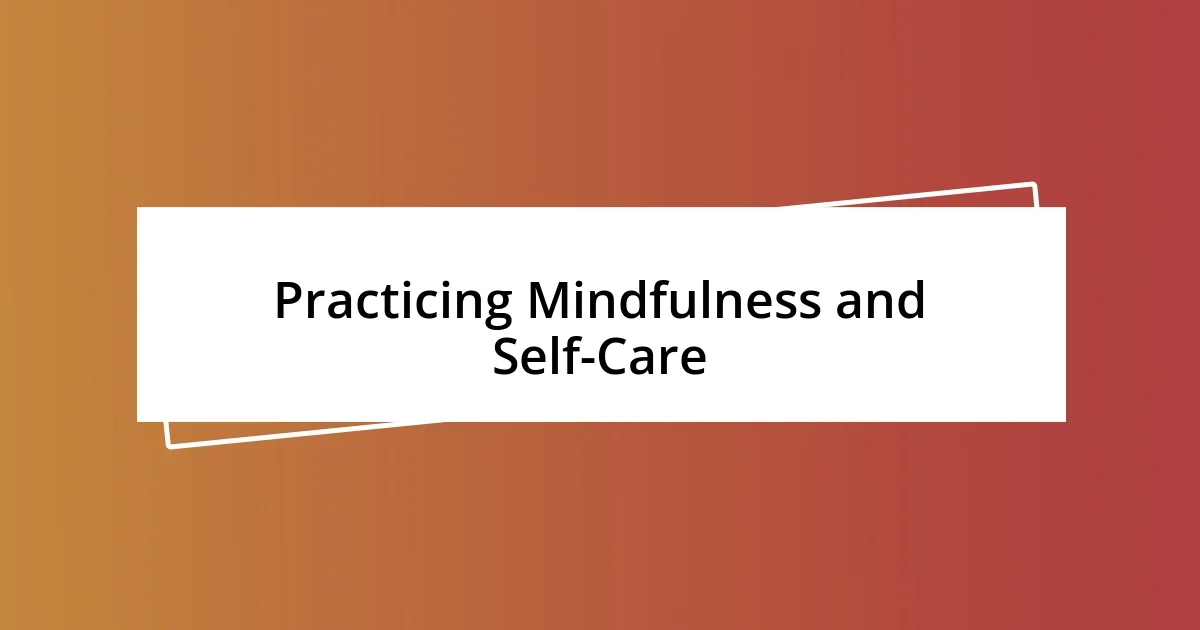
Practicing Mindfulness and Self-Care
Practicing mindfulness can be a transformative tool in self-care. I recall a moment during a particularly hectic morning when I felt completely overwhelmed by my to-do list. Taking just a few minutes to focus on my breath and notice the sensations in my body helped ground me. It’s fascinating how such a small act can bring a wave of calm, creating space for clarity to flood in.
Self-care goes beyond just physical practices; it’s about nurturing our mental landscape as well. I often find myself curling up with a good book or enjoying a warm cup of tea to reset my mind. This ritual allows me to disconnect from daily stressors and reconnect with myself. Have you ever noticed how a simple pause can shift your whole mindset? These moments become essential in cultivating resilience, as they remind us to honor our needs.
Integrating mindfulness and self-care into your routine doesn’t have to be complicated. Sometimes, I take a walk outside and immerse myself in nature, paying attention to the details—the rustling leaves or the chirping birds. This simple yet effective practice can refresh my perspective and enhance my emotional well-being. What small steps can you take today that could make a profound difference in your mental resilience?

Overcoming Challenges in Therapy
One of the biggest hurdles I faced in therapy was acknowledging my feelings of resistance. I remember sitting in my therapist’s office, feeling a knot in my stomach whenever we brought up certain topics. Instead of pushing those feelings away, I learned to lean into that discomfort. It was a revelation for me—embracing that resistance became a powerful way to explore what was really holding me back.
Tackling the challenges in therapy also requires patience with myself. During one session, I surprisingly became frustrated when I thought I wasn’t making progress. It dawned on me that growth isn’t always linear; it’s filled with ups and downs. I began to celebrate even the small gains, like being able to articulate a once-difficult emotion. Have you ever taken a moment to appreciate the little victories in your journey? Acknowledging my progress helped build my resilience further, allowing me to push through the tough spots with newfound determination.
Another crucial facet I’ve encountered is the fear of judgment when sharing my story. I vividly recall the first time I spoke about my childhood experiences. It felt like standing naked in a room full of people. But the more I shared, the lighter I felt—almost like a weight was lifting off my chest. Have you ever experienced that release after opening up? That moment reinforced my belief that vulnerability leads not just to resilience but to deeper connections. Embracing that fear transformed my therapy sessions from daunting to deeply enriching.
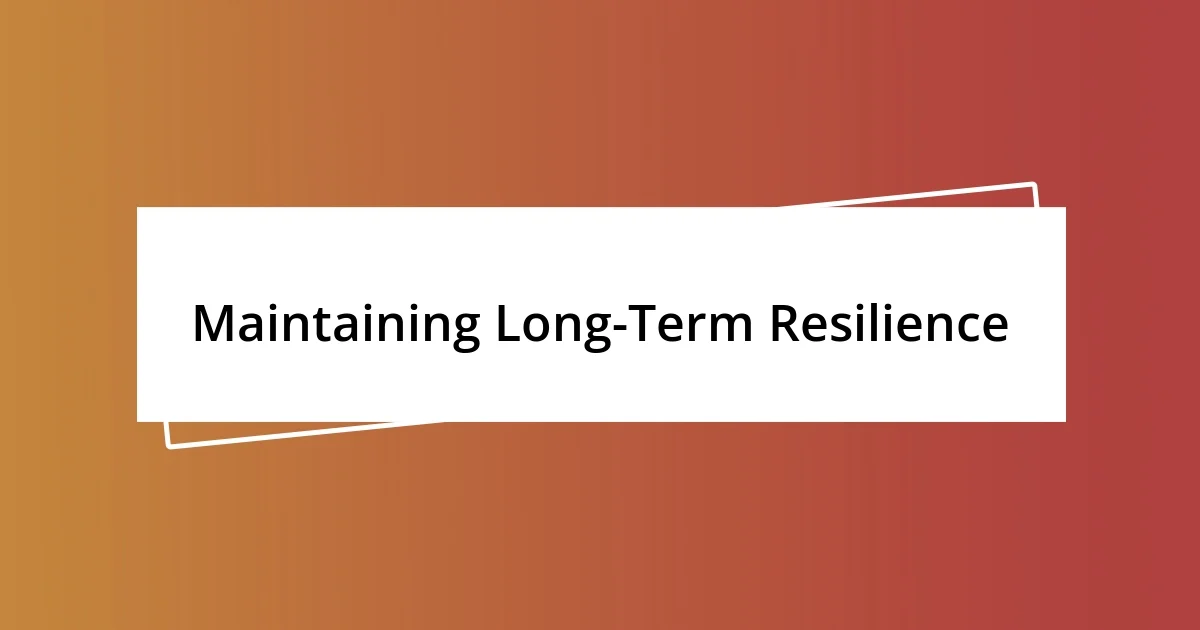
Maintaining Long-Term Resilience
Maintaining long-term resilience often hinges on the regular practice of reflection. I find myself jotting down thoughts and feelings at the end of each week. It’s like a mini therapy session on paper, helping me process what’s happened and how I’ve coped. Have you ever tried writing your own narrative? This simple act can illuminate patterns, showing you where you’ve grown and where you still have room to develop.
Another critical aspect is surrounding myself with supportive individuals. I’ve learned that sharing my journey with trusted friends can be incredibly empowering. I still remember the first time I opened up to a friend about my struggles; her response was heartwarming and validating. It reminded me that we’re not alone in our battles. Who are the people in your life that lift you up? Cultivating those connections can be a cornerstone of resilience.
I also focus on setting realistic goals for myself. I once aimed too high, leading to feelings of overwhelm rather than accomplishments. Now, I celebrate the small milestones—like finishing a book on mental health or practicing a new coping strategy. Each small win builds my confidence and resilience over time. Doesn’t it feel good to acknowledge the little steps forward? That’s the magic of maintaining resilience; it thrives on progress, not perfection.


